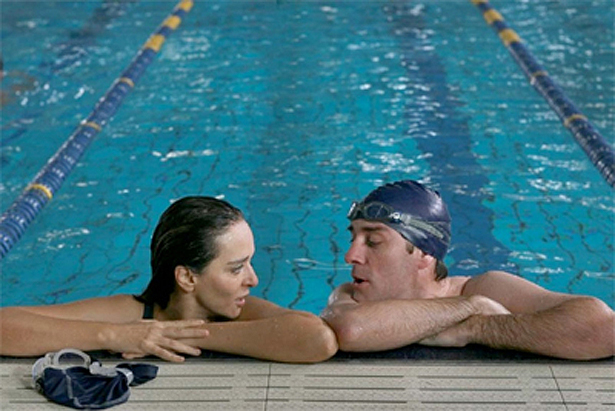In this film Giuseppe Piccioni returns to familiar themes of alienation and the decline of modern family structures, the resulting need for companionship and our value system that wraps it all in good and bad labels.
 The film’s 3 protagonists: Giulia, Guido and their swimming pool
The film’s 3 protagonists: Giulia, Guido and their swimming pool
The film runs 3 main parallel plot lines: the semi-successful writing career of Guido (Valerio Mastandrea), his deteriorating family structure until separation from his wife and daughter, the encounter of Guido with Giulia (Valeria Golino) – his daughter’s swimming instructor by day and as later revealed – a prison inmate by night. Hence, the movie title “Giulia non esce la sera – Giulia Doesn’t Date at Night”
As the relationship develops between Giulia and Guido, mostly emanating from the personal swimming classes Giulia provides Guido, Picconi vividly shows us the clear fault lines around us. In one of the many swimming pool scenes, Giulia brings Guido underwater to see the world from an unusual point of view – a wondrous twilight zone where all people are the same as they try to negotiate their way in the water.
The tables are radically turned when Guido needs to face questions about her past and fulfill her prison parole duties – off water. Confronted with Guido’s harsh prison reality and the reason why she ended up behind bars, you begin to realize that the swimming pool is Giulia’s only salvage, the only place where she can command control on others and at the same time can take stoke on her life from afar.
I especially liked Giulia’s blank facial expressions as she holds in her true story and how difficult it is to break down her defense walls she had built to fend off past ordeals from reappearing or new relationships with Guido to easily exist. True, it’s a natural survival instinct to learn from the past, however sometimes at the risk of generalizing and missing out on truly solid opportunities to connect and grow.
Some memorable visual signifiers include: the half vacated apartment Guido lives in, an effective internal representation of his life after his wife and daughter left him; the recurring appearance of the windows’ white shades the wind blows, which seems to indicate that winds of change are coming; and the numerous swimming pool scenes, signifying as mentioned above, an alternate reality, that also plays as the unassuming context/pretext for the relationship between Giulia and Guido to develop.
[youtube width=”615″ height=”514″]http://www.youtube.com/watch?v=WSG1iCxNo74[/youtube]
Piangi Roma – Cry Rome: Theme song by Bausetelle
As viewer, the film takes you on a journey where some elements are gradually revealed about its protagonists; a conflict is detected, solution is attempted sending rings of impact on sub-plots – packaged nicely with the emotive theme soundtrack by Baustelle, sung in part by Valeria Goilino. Beautiful!

